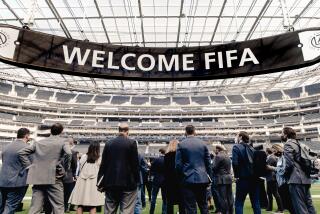San Diego Loses ’91 Super Bowl Bid to Tampa
- Share via
San Diego’s hopes of staging the 1991 Super Bowl--which will mark the 25th anniversary of professional football’s mega-spectacle--were dashed Wednesday when National Football League owners selected Tampa instead.
For what it’s worth, it took the NFL owners, who met behind the closed doors of the ballroom at the Hotel del Coronado, six rounds of balloting before Super Bowl-veteran Tampa nudged out newcomer San Diego in a weeding out process that started with five cities.
“The one obstacle was the fact we’d never had a Super Bowl,” said Bob Payne, head of San Diego’s Super Bowl Task Force, as he tried to pin down a reason for San Diego’s second-place finish.
$140 Million for Economy
After next January, when San Diego will host the game and gain an estimated $140 million-plus economic shot in the arm, that should no longer be a problem.
“After they play here next January, they’ll want to come back,” said a consoling NFL Commissioner Peter Rozelle to Chargers owner Alex Spanos, as the two stood in the hotel’s lobby minutes after the Tampa announcement.
By several accounts, San Diego’s economic package--estimated at more than $2 million--was the best of those presented by the five finalists--Miami, Anaheim, Los Angeles, Tampa and San Diego.
Among the incentives the city promised were free hotel rooms to the two teams playing the game and the NFL staff, all net revenues from stadium parking and the sale of novelties and concessions, as well as money generated from the so-called tent-city party village constructed around the stadium. Additionally, the city guaranteed to pay for a post-game media party of about 1,200 persons; turn over revenue from souvenir programs, and provide the league free use of the convention center for the commissioner’s large pregame party, according to Les Land, the task force’s executive director.
Package Offered
The economic package was superior to what the city had guaranteed the NFL when San Diego was awarded the 1988 game. For example, the city will receive half of the $402,510 that ARA Leisure Services bid for the right to sell novelties at Jack Murphy Stadium next January. But in the bid for the 1991 game, the city gave up its share and promised the NFL 100% of all novelty revenues.
In the escalating bidding war between communities for the Super Bowl, however, the financial gap between San Diego and Tampa was narrow. Tampa, for example, offered a laundry list of freebies to the NFL, including free hotel rooms, free airplane tickets to the NFL staff, revenue from novelties, parking and concessions, as well as tax-exempt status for Super Bowl tickets.
The NFL owners listened to last-minute presentations made by the five finalist cities before voting, including people such as Los Angeles Mayor Tom Bradley and sports announcer Dick Enberg, who spoke on behalf of Anaheim.
Down to the Wire
According to the league’s elaborate rules, any city winning 21 of the owners’ 28 votes in the early rounds would be declared the winner, with the community receiving the fewest votes in each round eliminated from the competition.
Rozelle said that after three rounds, only San Diego and Tampa--which staged the 1984 Super Bowl between the Los Angeles Raiders and Washington Redskins--were left. Two more rounds of ballots were tallied, but neither city was able to muster the necessary three-quarters majority. On the sixth and final tally, when only a simple majority, or 15 votes, was required, Tampa was named the victor.
Neither New York Giants owner Wellington Mara nor Kansas City Chief owner Lamar Hunt, both of whom counted the ballots, would reveal the final vote count. Spanos said the owners weren’t told the exact count.
Although San Diego lost, members of the task force and Spanos said the city would continue to lobby for the event in the future, beginning with the game for 1992.
“The next time the NFL puts out the call . . . we’ll be at the front of the line,” said Payne. Peg Nugent, the task force’s associate executive director, said the city’s strategy was to convince the NFL owners that San Diego is a serious contender.
“As a result of what we did here,” said Nugent, “ . . . we’ve turned the corner and removed any doubts about the city and our effort. We’re sad we didn’t get it but it’s a short-term loss, and we’ll be a serious contender in the future.”
Spanos said: “I can say this, we won’t lose the next time.”
More to Read
Go beyond the scoreboard
Get the latest on L.A.'s teams in the daily Sports Report newsletter.
You may occasionally receive promotional content from the Los Angeles Times.










